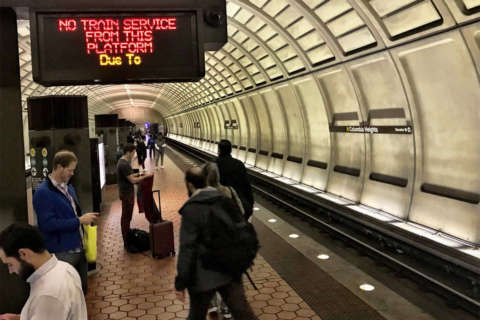Metro may be paying contractors millions for things that are not done correctly or done at all, the agency’s Office of Inspector General has found.
An audit of Metro’s contract oversight procedures uncovered a lack of training and oversight on dozens of contracts, even as Metro expanded its contracts to cover staffing, major construction projects — such as the summerlong Blue and Yellow Line shutdown — operations at the Cinder Bed Road bus garage in Lorton and, possibly, the new Silver Line extension into Loudoun County.
“Inadequate program management, inadequate training regimens … and inadequate and inconsistent application of internal controls leaves WMATA at a high risk of not receiving the goods and services for which it has contracted and making improper payments to contractors,” the audit found.
The risk is particularly high due to inadequate training and experience for those in charge of high-risk contracts.
“As a result, high-value contracts are at a high risk of delivery of goods and services that are not in conformance with contract terms and conditions and improper payments to contractors,” the audit said.
A $10 million rail parts contract and a $21 million information technology help desk contract are just two examples provided in the report.
For 36 of 38 contracts reviewed, there was no evidence of progress reports or other tracking to document whether contractors were doing work correctly.
In one case, Metro paid for an IT system before having evidence the system was actually provided. In others, payments were made to IT contractors hired to add to Metro’s staff either without proper approvals or based on “unrealistic daily time sheet hours.”
Metro had assigned contracting officer’s technical representatives to contracts worth more than $700 million in all as of June 15, 2018. These representatives are supposed to be the Metro employees ensuring that goods and services a contractor is paid for are actually provided.
The representatives are supposed to have specific roles outlined in appointment letters, but those letters were missing or incomplete in 22 cases, and in five other cases they were drafted only after the inspector general’s office asked for the documentation.
They are also the ones providing information to procurement officers that is used to determine whether contracts should be ended or extended, so a lack of proper training can lead to bad decision-making for the agency.
For 17 of 38 contracts reviewed, there was no evidence kept of the work being done or products provided before payments were approved.
For a cleaning contract, “the supporting documentation for the latest invoice on this contract could not be reconciled with the amount WMATA paid or reconciled with the contracted services,” the audit said.
Investigators also had questions about what Metro paid for heating oil. They found that in some cases the person in charge of approving payments was never even provided a copy of the contract the person was supposed to be monitoring.
The inspector general’s review of the 38 selected contracts, worth a total of $36.6 million, also found unclear appointments to the oversight positions, a lack of planning for succession or alternates, conflicting guidance in three different guide books and a lack of proper training for those approving payments under at least a dozen contracts.
Metro accepted the recommendations from the audit, and has promised to make major changes to the program by May 29, 2020.
Once the single guidebook, new training program, checklists and other changes are in place, the contracting representatives will be retrained over a two-year cycle starting in June 2020.
Most of the workers currently doing the job are responsible for the contracts as an additional task beyond their regular work. In a survey conducted by the Office of Inspector General, most estimated they spend fewer than 11 hours a week on their contracting roles, but said they only escalate issues to a contracting officer when major issues come up.
They cited a lack of training, lack of guidance and communications issues as challenges.







